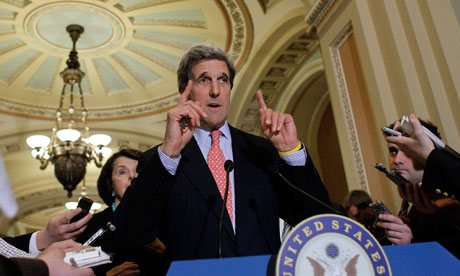US-Russia nuclear treaty on the cards after Senate vote
by editor | 2010-12-22 9:22 am
![]()
US Senate votes to end debate on ratification of Strategic Arms Reduction Treaty, paving way for ratification itself
Ewen MacAskill in Washington

Barack Obama is on the verge of securing his biggest foreign policy achievement so far after the US Senate voted today in favour of a US-Russian treaty to reduce nuclear arsenals.
The Senate vote by 67 to 28 was to limit debate on ratification of the treaty. It is expected to vote as early as today on ratification itself, which requires the support of two-thirds, or 67, of the members.
The scale of today’s vote means passage is all but certain.
John Kerry, the Democratic chairman of the Senate foreign affairs committee, said: “Today’s bipartisan vote clears a significant hurdle in the Senate. We are on the brink of writing the next chapter in the 40-year history of wrestling with the threat of nuclear weapons.”
Ratification would fulfil a campaign pledge by Obama that he would work to reduce the number of nuclear weapons.
The new treaty, replacing one signed in 1991, lowers the size of the US and Russian nuclear weapons stockpiles, limiting warheads and launchers, and updates the verification process. It has a seven-year deadline for implementation.
The vote represents a sudden turnaround in Obama’s fortunes after the low in early November when he presided over disastrous midterm Congressional elections in which the Republicans trounced the Democrats.
The present Congress, despite being labelled initially as a lame duck, has managed to reach agreement on three important issues within a matter of weeks: a bipartisan compromise on tax that will help stimulate the economy, repeal of the ban on gay people serving openly in the military and now, almost certainly, ratification of the New Strategic Arms Reduction Treaty (Start).
Although the Republican leader in the Senate, Mitch McConnell, on Sunday vowed to vote against ratification, saying it was being rushed through, many of his colleagues broke ranks today to vote with the Democrats.
Obama, in contrast with the seemingly aloof approach he has adopted in the past towards Congress, has been lobbying aggressively in favour of ratification. Yesterday, the chairman of the joint chiefs of staff, Admiral Mike Mullen, sent on a letter of support for ratification and today the defence secretary, Robert Gates, issued a similar statement.
Gates said: “The treaty will enhance strategic stability at lower numbers of nuclear weapons, provide a rigorous inspection regime including on-site access to Russian missile silos, strengthen our leadership role in stopping the proliferation of nuclear weapons, and provide the necessary flexibility to structure our strategic nuclear forces to best meet national security interest.”
The vice-president, Joe Biden, and Hillary Clinton, the secretary of state, also made a rare visit to the Capitol to lobby senators.
The balance tilted towards passage when a senior Republican senator, Lamar Alexander, came out in favour. “I will vote to ratify the New Start treaty between the United States and Russia because it leaves our country with enough nuclear warheads to blow any attacker to kingdom come and because the president has committed to an $85bn, 10-year plan to make sure that those weapons work,” he told the Senate.
Eleven Republicans voted with all the Democrats present.
New Start is the successor to Start I and Start II, treaties signed over the past 20 years. Start III was the monicker for a failed attempt by Bill Clinton and Boris Yeltsin.
Under the New Start treaty, the maximum number of warheads held by the US and Russia will be 1,550 each, and the number of intercontinental ballistic missiles set at 700.
However, the rules contain a loophole. While each warhead on a ballistic missile is counted as one warhead, a heavy bomber is counted as carrying “one warhead” even though it may have (in the case of a US B-52) up to 20 of them.
Obama signed it in Prague in April with the Russian president, Dmitry Medvedev, the firmest sign of growing US-Russian relations. If the Senate had rejected or even significantly delayed ratification, it could have led to a sharp deterioration in relations.
The US and Russia between them possess more than 90% of the world’s nuclear weapons.
Source URL: https://globalrights.info/2010/12/us-russia-nuclear-treaty-on-the-cards-after-senate-vote/